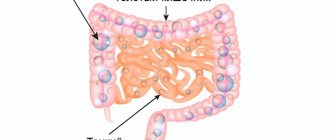Any unpleasant sensations arising in the abdominal cavity cause poor health. For various reasons, discomfort occurs in the abdomen, but the area of manifestation and intensity differ from each other, since belching, bloating, heartburn, and irritable bowel syndrome are caused by different sources. The nature of the discomfort determines the choice of the right way to get rid of the unpleasant sensation, because the body has given a clear signal that the functioning of the digestive system is impaired.
Causes of discomfort in the lower abdomen
Past illnesses for which you had to take antibiotics, pregnancy, stress, hereditary gastrointestinal diseases - all these are the most common factors leading to discomfort in the lower abdomen. It is possible to accurately determine the cause of discomfort with an examination, because the occurrence of pain is also due to factors such as:
- inflammation of the uterus and appendages in women;
- period;
- prostate disease in men;
- inflammatory processes of the bladder, ureter;
- appendicitis;
- compression or stretching of scars, adhesions, tumors in the abdomen;
- referred pain, when the source of discomfort is far from the pelvic area, but unpleasant sensations manifest themselves in it.
Pain and bloating
Irritable bowel syndrome (IBS), which is accompanied by a feeling of heaviness, bloating, and diarrhea - this is what half of the planet's inhabitants have encountered at least once. Not everyone goes to the doctor, preferring to solve a delicate problem on their own, which is not always justified. In some cases, it is really only necessary to change your diet, change your lifestyle, and reduce your stress level. And yet, discomfort in the abdomen, accompanied by the formation of gases in the intestines, is often not an independent disease, but indicates serious disorders of the gastrointestinal tract.
During pregnancy
If a pregnant woman has pain in the lower abdomen, especially in the early stages, then this is a cause for concern. When the pull in the lower abdomen is not too intense, this sensation is often caused by a restructuring of the body. The alarm should be sounded when pain in the lower abdomen during pregnancy is severe, especially if symptoms such as headache, fever, and spotting are added to the discomfort. No self-medication - seek immediate medical help, but it is better to call an ambulance.
Nausea and weakness
If pain is the fastest way the body warns of danger, then the accompanying feeling of discomfort in the abdomen, weakness with nausea, call for immediate attention to your health. Food poisoning is considered the leader in the list of reasons that cause such a reaction in the body. But we must not lose sight of factors such as gastrointestinal pathology, pregnancy, excessive physical activity, severe stress, and side effects of medications.
Heaviness after eating
Discomfort in the stomach, if the cause of the unpleasant sensation is situational in nature, for example, after a feast, will soon go away on its own. The situation is much more serious when the cause of severity is inflammation of the gastric mucosa. Along with bloating, gas formation, or when heartburn is observed after eating, belching, chronic or inflammatory processes of the digestive tract can be the cause of abdominal discomfort. Without a thorough examination and subsequent treatment, this unpleasant sensation simply cannot be dealt with.
Bowel movement that occurs with a delay of more than two days is commonly called constipation. Although regularity is determined by the physiological characteristics of each individual, the discomfort and painful sensations that arise due to it are considered a deviation. Especially if constipation takes the form of chronic, indicating a violation of the motor function of the large intestine, its incomplete cleansing. Increased fatigue, nausea, and headaches are common symptoms of abdominal discomfort.
Pain in the right side
Often associated with various kinds of diseases of internal organs. Violation of proper functioning can cause severe pain, and this is a direct signal to seek medical help. Discomfort in this area of the abdomen is life-threatening, because the causes of its occurrence can be either trauma or inflammation of the pancreas, gallbladder, liver, even hepatitis. They should be treated with no less caution when seeking medical help, as in the case when the lower abdomen hurts on the left.
For infants, discomfort is often associated with colic, which is caused by accumulated gases. Pain in older children is provoked by an imbalance of microflora, as a side effect after taking medications or introducing new foods. It happens that discomfort is caused by an intestinal infection, and then a special diet is required, read more about it on sovets24.ru. Feature of the children's digestive system: weak ability to cope with aggressive external factors. Hence dysbacteriosis, diarrhea, constipation, diathesis, parasites, which can cause discomfort and pain in the child.
The feeling of fullness in the abdomen after eating is different from abdominal pain during pregnancy. What to do to get rid of the discomfort caused by disruption of the digestive tract? Any practicing specialist will answer that in cases where the stomach hurts after eating or there is pain in the lower abdomen, different treatment regimens are prescribed. Not in all situations you need to immediately seek medical help, but you should not neglect it by taking painkillers when a pregnant woman’s stomach hurts or painful sensations are accompanied by chills and fever.
Irritable bowel syndrome
To eliminate discomfort in the intestines, there are folk remedies, but before using one or another method, it is better to consult a specialist. There are many different factors why there is irritation, heaviness, loose stools, rumbling, or when the inside begins to gurgle painfully, or the left side hurts. If the pain on the right side is constant, then you should immediately contact a gastroenterologist. Among the folk remedies it is allowed to use the following:
- Recipe 1. Ginger and cinnamon are spices that must be present in the diet. Season your dishes, brew weak warm tea to relieve pain, remove discomfort, and cope with flatulence.
- Recipe 2. Peppermint. Brew 1 tbsp. spoon of leaves in a glass of hot water, leave for at least half an hour, and then take before meals. Drink at least two glasses a day to relax muscles, normalize the functioning of the digestive system, and relieve yourself of discomfort in the abdominal area.
- Recipe 3. Herbal mixture: buckthorn bark, chamomile flowers, valerian root, mint leaves in equal proportions. Mix the herbs, pour a glass of water over the mixture, place in a water bath, bringing to readiness for a quarter of an hour. Infuse for the same amount of time, strain, and then take a quarter glass in the morning and evening before meals to relieve spasms, eliminate pain, and cope with discomfort.
Tablets for heaviness in the stomach
The choice of drug depends on the symptoms. Each tablet product has its own mechanism of action, but there is a category of “first aides” that should be in every home medicine cabinet. Such medications that will quickly relieve discomfort include activated carbon, white clay or Smecta, Mezim. But even they are recommended to be taken with caution, not overusing them, but only occasionally.
Tablets that help eliminate heaviness in the stomach, such as:
- Festal. For discomfort that has formed in the upper abdomen, take one tablet before or after meals. There is no need to chew the tablet, just drink it with water. To relieve abdominal discomfort, you can take two tablets at a time. The duration of treatment is several days.
- Allohol. The medicine helps normalize the excretion of bile, preventing stagnation. Take the tablet with or after meals. The daily dose to eliminate discomfort is one or two tablets.
After lifting weights
With incorrect or excessive loads, discomfort and pain may occur. Sensitive nerve endings in the abdominal cavity and abdominal muscles respond to external stimuli. Gradually, this pain goes away, but to exclude a serious threat to health, you should consult a doctor. Based on the intensity, location and nature of the pain in the abdominal area, the specialist will make a diagnosis and prescribe treatment.
- Be sure to buy a bandage, wear it when there is a possibility of lifting weights or discomfort has already made itself felt.
- Get tested to rule out or detect gastroptosis (prolapse of the stomach).
- Choose a gentle diet, resort to relaxation and, if not prohibited, massage to eliminate discomfort.
- Clay applications help with abdominal pain caused by lifting weights. A layer of up to two centimeters is applied to the area affected by pain. Next, the cake is kept for about three hours, washed off with warm water, and after several sessions the unpleasant sensations pass, leaving the discomfort far behind.
- A folk remedy is an alcoholic herbal tincture, for which you need to take half a liter of vodka, 120 g of crushed dry roots of Potentilla erecta (kalgan). The remedy for discomfort after lifting weights should infuse for 2 weeks, and take it one tablespoon in half a glass of water before meals, preferably at least twice a day, to normalize the functioning of the internal organs of the abdomen.
Video about feeling discomfort in the stomach
When discomfort occurs in the abdomen, it is better to look for the cause immediately. The feeling of discomfort, even severe painful phenomena, can be provoked by factors that are incomprehensible at first glance. How and with what to treat bloating, remove gas, heaviness, solve the problem of belching - all this is explained in an accessible video format. Those who carefully follow the recommendations presented below will be able to help themselves or their loved ones by eliminating discomfort and identifying signs of disruption of the digestive system.
Can IBS be cured?
Why does bloating occur?
Considering the list of symptoms related to digestive disorders, the prevalence of such manifestations as abdominal discomfort is observed. Gastroenterologists associate the frequency of this pathology with the modern rhythm of life. Today, a large percentage of people eat on the go, in a hurry. A full meal is replaced with fast food, teas and compotes with carbonated drinks. Such habits are complemented by a sedentary lifestyle and lack of exercise. The result is discomfort, often accompanied by pain, flatulence and other symptoms. It is recommended not to ignore suspicious signs, but to visit a doctor and get examined in order to prevent the development of diseases.
Stomach discomfort after eating is familiar to every person. There are a number of reasons for this condition that you should be aware of. This sign may indicate the presence of a serious illness in the gastrointestinal tract or be a consequence of an unbalanced diet. In some cases, abdominal discomfort is caused by stress or emotional stress.
Unpleasant sensations in the stomach after eating are localized in the epigastric region. Basically, discomfort in the stomach occurs against the background of such pathological conditions as:
- peptic ulcer of the duodenum and stomach;
- pancreatitis;
- gastroesophagitis;
- gastritis, which has a diverse nature;
- cholelithiasis.
It is difficult to identify the cause of the malaise. This requires laboratory and instrumental research. Thanks to timely, competent diagnosis, pathology can be recognized at an early stage, which will increase the chances of a quick recovery.
One of the most common reasons for abdominal discomfort, nausea and a feeling of heaviness is poor nutrition. Spicy, salty, fatty and sweet foods have a detrimental effect on the gastric mucosa, irritating and destroying its integrity. Bad habits are considered another cause of malaise and weakness of the digestive tract.
Medicines can provoke dyspeptic syndrome, especially if they are taken without a doctor’s prescription. Also, discomfort in the abdomen is observed during pregnancy. This is due to hormonal changes, as well as an increase in the size of the uterus.
The most common symptom of such ailment is constant nausea, indicating a pathology of the digestive system. In this case, it is possible to diagnose diseases of the digestive system, poisoning, and infectious diseases.
Discomfort in the abdomen may be accompanied by the following symptoms: flatulence, pain, heaviness in the epigastric region. Classification of dyspepsia: functional and organic. Provocateurs of this syndrome are stressful situations, the presence of increased acidity of gastric juice, Helicobacter pylori, unhealthy diet, impaired motility of some parts of the gastrointestinal tract, and the use of medications.
We should not forget about irritable bowel syndrome, which is a chronic pathology caused by improper functioning of the intestines. Causes of IBS: stress, lack of fiber in the diet, abuse of carbonated foods, caffeine and junk food.
When to see a doctor?
A visit to a gastroenterologist should be made immediately if, in addition to morning pain, the following symptoms are observed:
- Nausea and vomiting.
- Problems with bowel movements: prolonged constipation or diarrhea.
- The pain became permanent.
- Body temperature is higher than 37°C.
- Increased gas formation or flatulence in the abdomen.
Specifics of the therapeutic course for discomfort
To eliminate abdominal discomfort, you must follow your doctor's instructions. Therapy should include medication, folk remedies and diet therapy. Doctors recommend switching to frequent, split meals in small portions. It is necessary to drink at least 2 liters of fluid per day, consume foods rich in fiber, and give up soda, alcohol and junk food.
As for medications, it is strictly forbidden to take them without the doctor’s knowledge, otherwise the clinical picture may worsen. The goal of therapy is to relieve symptoms and eliminate the cause of the illness. Prescription of medications occurs in the following way:
- in case of hypersecretion of gastric juice, you need to take antacids, as well as heartburn medications - Almagel;
- if there is a lack of enzymes, replacement therapy is used - Mezim, Festal;
- An antispasmodic - No-Shpa - is suitable for pain relief;
- for problems with motility and peristalsis, prokinetics are prescribed.
Among folk remedies, rice decoction deserves special attention. The cereal is boiled in water, maintaining a ratio of 1 to 6. Take ½ cup every 2 hours. It is useful to drink tea with lemon and honey. This drink improves the functioning of the gastrointestinal tract.
Discomfort that occurs in the abdomen requires an integrated approach to treatment. Be sure to visit a gastroenterologist and get the necessary tests. Following a diet prescribed by a doctor will help quickly relieve unpleasant symptoms.
Many people complain of abdominal pain, but do not seek medical help. Some people don’t like doctors and hospitals, others avoid diagnostic procedures. Some are even afraid to find out about a far-fetched, terrible diagnosis and therefore put off going to the doctor for a long time. What diseases and disorders can cause discomfort or pain in the abdomen?
Gallstones and cholecystitis
The resulting stones block the duct for the release of bile into the small intestine, which causes pain in the gallbladder. As a rule, the upper right part of the abdomen hurts, especially after eating fatty foods. If a person has cholecystitis, contractions of the gallbladder will also be accompanied by pain. Read more about this disease in the article “How to recognize the symptoms of cholecystitis.”
To diagnose gallbladder diseases, ultrasound examination and blood tests are prescribed.
Inflammation of the pancreas causes severe, burning pain in the middle or upper abdomen. Sometimes the pain radiates to the back and chest. A person experiences nausea, vomiting, and fever. Among the main reasons for the development of pancreatitis are alcohol addiction, as well as the formation of gallstones. Pancreatitis often requires hospitalization.
As with gallbladder diseases, if pancreatitis is suspected, blood tests and an ultrasound of the abdominal organs should be performed. To prescribe appropriate studies, make an appointment with a gastroenterologist.
Gastritis
Gastritis is an inflammation of the stomach lining that causes pain in the upper abdomen - just below the breastbone. This pain is often described as a burning sensation. With gastritis, there is a feeling of a full stomach after eating, nausea, and vomiting.
Stomach or duodenal ulcer
If your stomach hurts, you may be suffering from a peptic ulcer. In most cases, the pain is in the middle or upper abdomen. Sometimes pain appears after eating. People with duodenal ulcers may wake up at night.
The main causes of ulcer development are the bacterium Helicobacter pylori and the use of non-steroidal anti-inflammatory drugs (NSAIDs).
Gastroesophageal reflux disease (GERD)
When the valve that separates the stomach from the esophagus is weakened, food and acidic stomach juices move in the opposite direction - upward. This causes pain known as heartburn. The localization of pain with GERD is the upper abdomen and lower chest.
If you suspect gastritis, peptic ulcer or GERD, you should consult a gastroenterologist. In most cases, the patient will be prescribed a gastroscopy procedure. Some additional tests may be needed - a blood test and a breath test to detect the bacterium Helicobacter pylori.
Despite the fear of gastroscopy, after this procedure is performed by our specialists, many patients feel great relief. Most people stop feeling afraid of gastroscopy altogether. This is because at Persomed we carry out this procedure very quickly and painlessly.
Inflammatory bowel diseases (IBD)
If your intestines hurt, you may be suffering from inflammation of its walls. This group of diseases includes Crohn's disease and ulcerative colitis.
Inflammatory bowel disease can lead to scarring, abdominal abscesses (peritonitis), and intestinal obstruction. These serious changes manifest as abdominal pain along with diarrhea and rectal bleeding. Symptoms of IBD are chronic, but appear in cycles: they flare up and then fade away. For this reason, diagnosing the disease can be difficult.
IBD must be constantly monitored, because it leads to very serious consequences. Advanced stages of inflammatory bowel disease can lead to cancer.
People with irritable bowel syndrome suffer from abdominal pain, cramping and bloating. At the same time, some suffer from constipation, others from diarrhea, and for others, periods of constipation and diarrhea alternate. As a rule, the feeling of discomfort or cramping disappears after a bowel movement. Unlike inflammatory diseases, IBS does not harm the intestines, although it causes great discomfort to the patient.
Diverticulitis
Inflammation of the pockets that form in the intestinal lining is called diverticulitis. The disease manifests itself in the form of pain in the lower abdomen - in the left part. Associated symptoms include low-grade fever, nausea, vomiting, constipation, or diarrhea.
People who ignore diverticulitis may face serious complications - peritonitis, bleeding, and the formation of holes in the intestine. In some cases, the patient needs surgery.
In case of diseases and intestinal dysfunction, it is necessary to visit a gastroenterologist as soon as possible. Remember, the sooner you seek medical help, the lower the risk of complications.
Stones in the kidneys
Sharp pain that appears in the back and seems to move around the abdomen, reaching the groin area, can signal kidney stones. The pain comes and goes when the stone leaves the body. During the act of urination, a person may experience pain and find blood in the urine.
The main diagnostic procedure for identifying kidney stones is an ultrasound of the urinary system, which can be performed in our center. A urine sample is also taken from the patient for testing.
Endometriosis
This disease affects only women and is often asymptomatic. Sometimes endometriosis manifests itself as pain in the lower abdomen before the onset of menstruation. Pain and spasms may occur during urination, bowel movements and during sexual intercourse.
With endometriosis, cells in the lining of the uterus—the endometrium—grow outside the uterus. Typically, the cells spread to the ovaries, fallopian tubes, and other areas of the pelvis. If you suspect endometriosis, you should consult a gynecologist.
Appendicitis
Inflammation of appendicitis is manifested by sudden pain in the center of the abdomen, which moves to its lower right side. Appendicitis mainly affects children and young people. Ignoring inflammation of the appendix is extremely dangerous, because it can burst and cause peritonitis.
If you notice symptoms of appendicitis in yourself or your loved ones, call an ambulance immediately!
Oncological disease
This disease can affect any of the abdominal organs - liver, pancreas, stomach, gall bladder, ovaries. Pain usually appears in later stages. Other symptoms include loss of appetite and weight, persistent vomiting, and bloating.
Parasites can live in the intestines for years without causing any symptoms. When they make themselves felt, a person not only has intestinal pain, but may also experience:
- Diarrhea
- Nausea and vomiting
- Bloating
- Stool with blood and mucus
- Rash or itching around the rectum or vulva
- Feeling tired
- Weight loss
To check whether a person has parasites, a stool test and/or tests for antibodies to Giardia, Trichinella, Ascaris, Echinococcus and other parasites are prescribed. All these studies are carried out in our medical center.
Lactose intolerance
Millions of people suffer from this type of food intolerance. Among its symptoms:
- Moderate abdominal pain
- Flatulence
- Belching
- Diarrhea
There is only one solution - complete or partial refusal of dairy products.
Gluten intolerance
Gluten is a protein found in wheat, barley and rye. In people with intolerance, this protein damages the walls of the small intestine. As a result, its ability to absorb nutrients received from food is lost.
A person with intolerance has a stomach ache, flatulence and a feeling of fatigue. The most severe form of gluten intolerance is called celiac disease.
Spinal diseases
Up to 62% of patients with spinal diseases suffer from abdominal pain, bloating, constipation, and hemorrhoids. Such data were provided by American specialists from the University of Medicine in 2012.
Some patients who do not suffer from diseases of the gastrointestinal tract complain of abdominal pain due to orthopedic problems. If you belong to this category of people, an experienced orthopedic traumatologist will do everything possible to improve the health of your spine. Perhaps it is problems with the spine that cause pain in the abdominal area.
Stress and depression
Constant stress can also cause abdominal pain. If a person develops depression, their chances of experiencing irritable bowel syndrome increase.
When to seek medical help:
- Abdominal discomfort lasting 1 week or longer
- Abdominal pain that does not subside within 24-48 hours or gets worse
- Pain with nausea and vomiting
- Bloating for more than two days
- A burning sensation during urination or frequent trips to the toilet
- Diarrhea that lasts several days
- Pain in the abdominal area with increased temperature
- Prolonged vaginal bleeding
- Unexplained weight loss
In what cases should you call your doctor immediately:
- A man suffers from cancer and has a stomach ache
- Constipation accompanied by vomiting
- Vomiting blood or blood in the stool
- Black or tarry stools
- Sudden, sharp abdominal pain
- Pain between the shoulder blades accompanied by nausea
- The abdomen is sensitive and painful to touch, or vice versa – the abdomen is hard and hard to the touch
- Abdominal pain during pregnancy
- Recent abdominal trauma
Why is it important to seek help as early as possible?
Almost each of the diseases discussed does not just cause pain and unnecessary worries.
If you do not get medical help in time, serious and sometimes life-threatening complications can develop. Don’t wait, make an appointment through the electronic registration form or call the numbers listed at the top of the site.
Abdominal discomfort is a symptom that manifests itself as a feeling of pain in the abdomen, bloating due to unstable functioning of the gastrointestinal tract. It can act as a sign of a certain gastroenterological process, as well as a short-term disruption of the functioning of the digestive system. The latter may be due to food poisoning, side effects of certain medications or psychosomatics. In any case, if there is constant discomfort in the abdomen, you should consult a gastroenterologist and not self-medicate.
Predisposing etiological factors include the following:
- abuse of fatty, spicy, overly seasoned foods;
- eating poorly compatible foods;
- improper diet - eating on the go, eating before bed or at night;
- strict diet;
- binge eating;
- excessive alcohol consumption.
As for the pathological processes in the clinic of which this symptom is present, the following should be highlighted:
- intestinal dysfunction;
- gastritis, gastroduodenitis;
- pathology of the prostate gland in men;
- inflammation of the ovarian appendages in women;
- pathological processes in the kidneys and liver;
- urolithiasis disease;
- ulcerative lesions of the stomach;
- other gastroenterological pathologies - almost all of them have this symptom in their clinical picture.
Pain and heaviness in the lower abdomen are often observed before menstruation. The manifestation of the same symptom in the early stages of pregnancy requires a mandatory examination by a doctor, as this can be dangerous not only for the health of the mother, but also the child. Especially if the pain is accompanied by bleeding.
Separately, the etiological factors of stomach discomfort in children should be highlighted:
- accumulation of gases, increased flatulence, which may be due to poor nutrition;
- intestinal infection;
- dysbiosis.
The presence of such a sign in a child requires mandatory consultation with a pediatrician.
Symptoms
The clinical picture will definitely be supplemented by specific signs, depending on the underlying factor. Common symptoms include the following:
- bloating, flatulence;
- nausea, sometimes with bouts of vomiting (depending on the etiology);
- lack of appetite;
- unstable stool - sudden attacks of diarrhea may be followed by prolonged constipation.
Discomfort in the lower abdomen during pregnancy can be accompanied by the following symptoms:
The presence of such a clinical picture in an expectant mother requires urgent medical attention, since there is a high probability of termination of pregnancy.
In gastroenterological pathologies, this symptom may be supplemented by the following clinical picture:
- nausea, often with vomiting;
- bloating, especially in the morning or after eating;
- frequent bouts of diarrhea;
- there may be particles of undigested food or blood in the stool;
- deterioration of appetite or its complete absence;
- low-grade body temperature;
- increased sweating;
- stomach pain, which may get worse after eating;
- belching, sometimes with an unpleasant odor;
- feeling of an unpleasant taste in the mouth;
- heartburn;
- weight loss for no apparent reason.
It should be understood that bloating in the intestines and attacks of pain can be a manifestation of either simple food poisoning or a certain pathological process. Therefore, self-medication is unacceptable for the reason that without an accurate diagnosis and establishment of the etiological factor, it will be ineffective. In addition, there is a high probability of developing serious complications.
Why do women and men have stomach ache in the morning?
If your stomach hurts badly in the morning, the following pathological processes can be considered as causes::
- various diseases of the gastrointestinal tract, in particular the liver, spleen, pancreas, biliary tract;
- disruption of bowel movements (constipation or diarrhea);
- intoxication of the body due to consumption of poor-quality food or poisoning with chemicals;
- inflammatory processes in the tissues of the peritoneum, gastrointestinal tract;
- impaired blood circulation or other pathological processes in the abdominal cavity;
- helminthic infestations, etc.
If the lower abdomen hurts severely in the morning, the cause may be various diseases and inflammatory processes in the genitourinary system.
Diagnostics
If such a symptom occurs, you should contact a gastroenterologist. The diagnostic program may include the following:
- physical examination of the patient with palpation of the abdomen and clarification of the general history;
- ultrasound examination of the abdominal organs;
- gastroscopy of the stomach;
- FEGDS;
- general and biochemical blood test;
- general urine analysis;
- coprogram;
- colonoscopy.
Additional diagnostic methods will depend on the current clinical picture, general condition of the patient and medical history. If the patient took any medications before the examination, without prescription, you should definitely notify the doctor about this before starting the diagnosis. Unauthorized use of the drug can lead to a blurred clinical picture, incorrect diagnosis, and, as a result, incorrect treatment, which is also fraught with consequences.
Basic therapy will depend on the underlying factor. If the development of such a condition is simply due to poor nutrition, you should normalize your diet. Diet therapy is almost always included in treatment.
Drug therapy may include the following drugs:
- antispasmodics;
- enterosorbents;
- to stabilize gastric motility;
- antiemetics;
- to normalize gastric motility;
- prebiotics.
As for dietary nutrition, it is recommended:
- exclude from the diet ingredients that provoke fermentation in the intestines;
- minimize or completely eliminate fresh baked goods and legumes;
- exclude fatty, fried, pickled and overly seasoned foods;
- steam, boil or bake food without fat;
- The consistency should be liquid or puree.
Food consumption should be frequent (4-5 times a day), in small portions, but with a break between meals of at least three hours.
Treatment with folk remedies is possible, but only if it is agreed with the attending physician. As a rule, traditional medicine can only be used as an addition to the main course of therapy or as a preventive measure.
First aid for a child
If a child has a tummy ache due to impaired digestion, parents need to carefully monitor their child’s diet: exclude all gas-forming foods from the menu (milk, pickles, beans, bread, kvass, mushrooms), supplement it with fiber.
What to do if an acute abdomen occurs? First aid for stomach pain is to call an ambulance. Only a doctor can determine the cause of acute pain and select the appropriate treatment.
Before the ambulance arrives, you are only allowed to apply an ice pack to the baby’s stomach to alleviate his condition.
If abdominal pain appears, you need to put the child on his back; if there is vomiting, he needs to turn his head to the side, bend his knees, slowly stroke the stomach clockwise - this position will help relieve spasm and reduce the manifestation of pain.
What to do if your child has a stomach ache
- Visit a doctor, take a general blood test, urine test, stool test, do an ultrasound, MRI, and x-ray of the abdominal organs. Colonoscopy, irrigoscopy, FGS are mandatory diagnostic methods for suspected gastrointestinal pathology.
- Give the child a painkiller based on paracetamol, ibuprofen, antispasmodics No-Shpa (Drotaverine) help well. But resort to medication only in extreme cases, medications blur the clinical picture, and it will be difficult for the doctor to quickly establish a diagnosis.
- In case of severe vomiting, diarrhea, or fever, the main task of parents is to avoid dehydration. Give your child small portions of water every 5 minutes, even by force; it is better to use Regidron, Oralit, or regular water without gas.
What not to do if you have stomach pain
Don't be too quick to apply heat. If the discomfort is caused by an attack of appendicitis or other infectious pathologies, then any warming procedures will only worsen the situation; cold compresses also cannot be applied without preliminary diagnosis.
It is forbidden to wash or try to feed the baby. If you have diarrhea and vomiting, you do not need to immediately give medications to eliminate these symptoms - this is how the body tries to cleanse itself of toxins.
Встречаются исключительно индивидуально, реальные путаны в Белогорске по вызову к салонам отношения не имеют - redbelogorsk.ru. В одном месте собраны настоящие анкеты с фотографиями и контактными данными самых лучших проституток города. Милые реальные путаны в Белогорске по вызову, пылкие и страстные, они такие активные и стройные, что удовольствие неизбежно. Выбери девушку сейчас.









